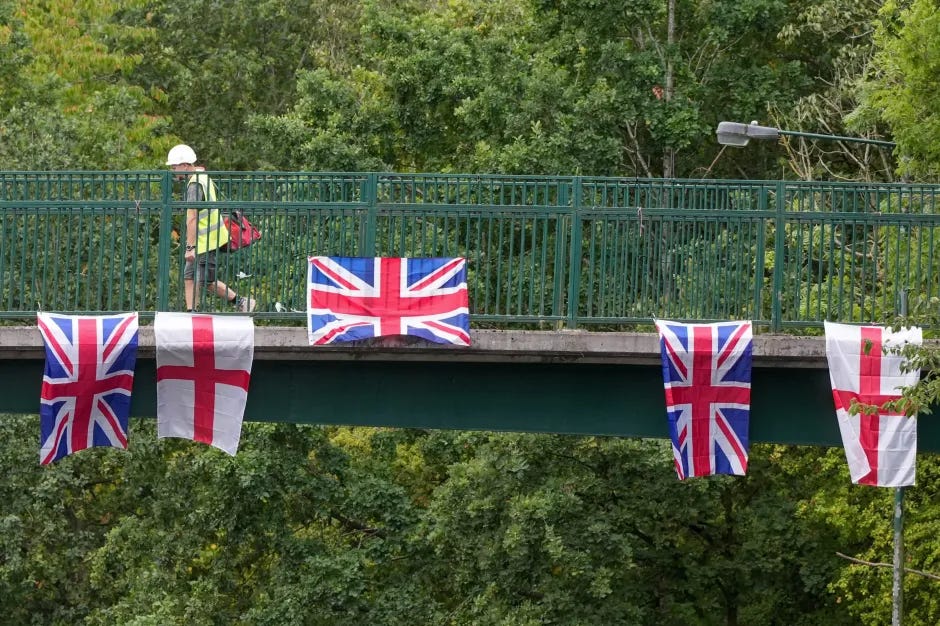Flagging a problem
Why mostly flag-free England has suddenly become awash with flags and why it matters
England has a problem with flags, primarily the St George’s Cross flag. It has been hijacked by right wing extremists fueling the toxic debate over immigration. In theory the flag is just one the United Kingdom’s four national flags but in practice it has been pressed into service as an aggressive assertion of anti-foreigner English identity.
This is despite the fact that many of the flag wavers are blissfully unaware that St George was either Turkish or Greek and is the patron saint of both Catalonia and Georgia. That seems to make him one of those dreaded foreigners. This assumes that facts matter, which is clearly not the case here.
The English have never been great flag wavers outside of sports arenas but now whole streets are festooned with flags and mini-roundabouts have been pressed into service for displays of the St Geroge emblem.
The St George’s flag was originally a Crusaders symbol, which strongly reflects the idea of Plucky Brits going out to save the rest of the world, even though the reality is that many, probably most, Crusaders were not English and their crusades in the name of Christianity were bloodthirsty affairs, less concerned with spiritual intent than good old fashioned plunder.
The ease with which the extreme right has asserted ownership of this flag says something about a perennial lack of certainty over English identity. The Scots and Welsh do not share this ambivalence, it’s another can of worms in Northern Ireland but the problem is more complex in the UK’s largest nation probably precisely because England is so much bigger than the other nations and therefore the idea of being British and English appear to be interchangeable.
There is no inherent reason why identifying as English should be overlaid with racist views and xenophobia but the extreme right have increasingly made it so even though many of the born again St George’s flag wavers are adamant that they are not racists, insisting that they are patriotic.
Patriotism is a tricky business, particularly for Britain’s Left which has a more internationalist outlook and is often uncomfortable accommodating nationalist sentiment. No one on the Left wants to be accused of being an isolationist Little Englander and there is some wariness over the Union Flag because of Britain’s colonial history, where the flag represented domination of foreign lands and was foisted upon the colonies as a symbol of their subservience.
The Right has more enthusiastically attached itself to the Union flag and brandishes its patriotism. Moreover it is more comfortable with the colonial past to the extent of embracing the notion of Britain’s civilizing mission to the rest of the world.
The idea of being proud of your country is hardly controversial. Yet some of the most avid patriots are anything but proud of Britain today. They decry its multi-culturalism, point to moral laxity and paint a picture of a nation in terminal decline. The country they are proud of exists only in a concocted version of the past.
Those of us who admire what Britain has to offer today, not least its diversity, respect for rule of law and democratic traditions, tend to be more modest in proclaiming our patriotism.
The government cowers in the face of this flag debate, terrified of the accusation that is not patriotic enough, while nervous over patriotic extremism.
Thus Prime Minister Starmer makes a point of surrounding himself with the Union flag and his tightly controlled band of ministers are under strict instructions to say nothing that will upset the extreme patriots.
What they should be doing is calling out the racists, unashamedly defending British tolerance and embrace of different cultures and not shirking the duty of enhancing the present by critically examining the past.
Mealy mouthed condemnation of those who have hijacked the flag for their own political purposes will never work. This is the unambiguous lesson of history and it is very hard to understand why it is not understood in Downing Street.
If it’s any comfort, Britain is not alone in suffering flag angst. In America the unreconciled Southern states and their extremist right wing allies are still waving the confederacy flag. In the republics that were part of the USSR, flags have never ceased to be a controversial issue (if in doubt, take a quick trip to Ukraine) and in Hong Kong, where I used to live, you may be surprised to learn that display of the old colonial flag (which most ex-colonies could not wait to dump) was proudly displayed as a way of defying the Chinese Communist Party.
So, clearly flags matter and flag angst will be with us for quite a while, maybe forever.



I’m visiting the UK … we happened to drive to a Gastro pub in Barrowford near Colne… it was festooned in St George’s flags all at half mast …. It felt weird and unwelcoming…. Luckily, the pub wasn’t suitable as it had zero parking and we were able to go to a delightful country pub a short distance away - the food was fantastic and the staff were very friendly….. would definitely have felt uncomfortable in the 1st pub with all those flags along the street.
As for Keir Starmer …. a huge disappointment…..